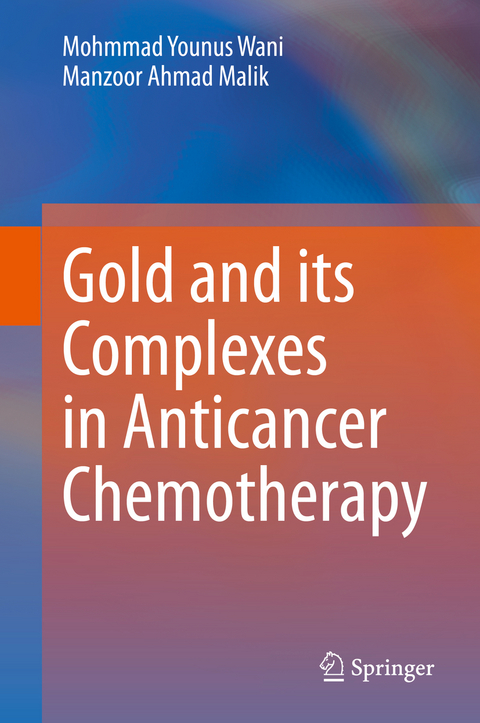
Gold and its Complexes in Anticancer Chemotherapy
Springer Verlag, Singapore
978-981-336-313-7 (ISBN)
Dr. Wani graduated from Jamia Millia Islamia, New Delhi, India in 2013. Received a senior research fellowship from CSIR-India and FCT postdoctoral fellowship from Portugal. Worked as a postdoctoral fellow with Prof. A. Sobral group from 2013-2016 on the development of fungal cell wall targeted antifungal therapies. In fall 2016, Dr. Wani moved to the University of Texas, USA and worked with Dr. K. Tsuchikama’s group at Texas Therapeutics Institute, Brown Foundation Institute of Molecular Medicine, UTHealth on the development of non-traditional antimicrobial agents and peptide based cleavable linkers for ADC’s. In fall 2017, Dr. Wani was appointed as assistant professor in Chemistry Department, Faculty of Sciences, University of Jeddah, KSA. Dr. Wani continues to work on the development of new small molecules, metal complexes and novel strategies to combat microbial infections and cancer at the interface of chemistry and biology. He has many international publications, book chapters, and two books, besides many international and national honors and awards to his credit. Dr. Wani is working hard to advance the medicinal chemistry and drug discovery field with new questions and pertinent issues of 21st century. Manzoor Ahmad Malik was born and raised in district Pulwama of Jammu and Kashmir, India. He did his BSc. from University of Kashmir and received his Master’s in Chemistry from the Department of Chemistry, Jamia Millia Islamia, New Delhi, India. Dr. Malik received M. Phil in Chemistry from Jiwaji University, and Ph.D. from Jamia Millia Islamia, New Delhi, India. He received a Senior Research Fellowship from CSIR, India in 2019. He has several international publications including research articles and book chapters to his credit. His research interests include, design and synthesis of small molecule inhibitors and metal complexes for microbial infections and cancer. Dr. Malik is currently working on the development of non-platinum metal complexes that could be used for anticancer chemotherapy with better efficacy and less toxicity compared to the platinum drugs used in cancer therapy.
Chapter 1. Cancer.- Chapter 2. Types of cancer.- Chapter 3. Classification.- Chapter 4. Cancer or tumor nomenclature.- Chapter 5. Heterogeneity.- Chapter 6. Invasion and metastasis.- Chapter 7. How cancer arises?.- Chapter 8. Epidemiology.- Chapter 9. Economic burden.- Chapter 10. Treatment modalities.- Chapter 11. Chemotherapy.- Chapter 12. Properties of metals and metal complexes.- Chapter 13. Platinum based anticancer agents.- Chapter 14. Chemistry of cisplatin.- Chapter 15. Mechanism of action of platinum drugs.- Chapter 16. Non-platinum anticancer agents.- Chapter 17. Chemistry of gold.- Chapter 18. Gold and its complexes in medicine.- Chapter 19. Auranofin and its analogues.- Chapter 20. Classes of gold complexes.- Chapter 21. Mechanisms of action of anticancer gold complexes.- Chapter 22. Perspectives.
| Erscheinungsdatum | 24.02.2021 |
|---|---|
| Zusatzinfo | 29 Illustrations, color; 95 Illustrations, black and white; IX, 173 p. 124 illus., 29 illus. in color. |
| Verlagsort | Singapore |
| Sprache | englisch |
| Maße | 155 x 235 mm |
| Themenwelt | Medizin / Pharmazie ► Medizinische Fachgebiete ► Onkologie |
| Medizin / Pharmazie ► Medizinische Fachgebiete ► Pharmakologie / Pharmakotherapie | |
| Medizin / Pharmazie ► Pharmazie | |
| Naturwissenschaften ► Biologie ► Biochemie | |
| Schlagworte | Cancer • Chemotherapy • Cytotoxicity • Gold • Gold Complexes |
| ISBN-10 | 981-336-313-4 / 9813363134 |
| ISBN-13 | 978-981-336-313-7 / 9789813363137 |
| Zustand | Neuware |
| Informationen gemäß Produktsicherheitsverordnung (GPSR) | |
| Haben Sie eine Frage zum Produkt? |
aus dem Bereich


